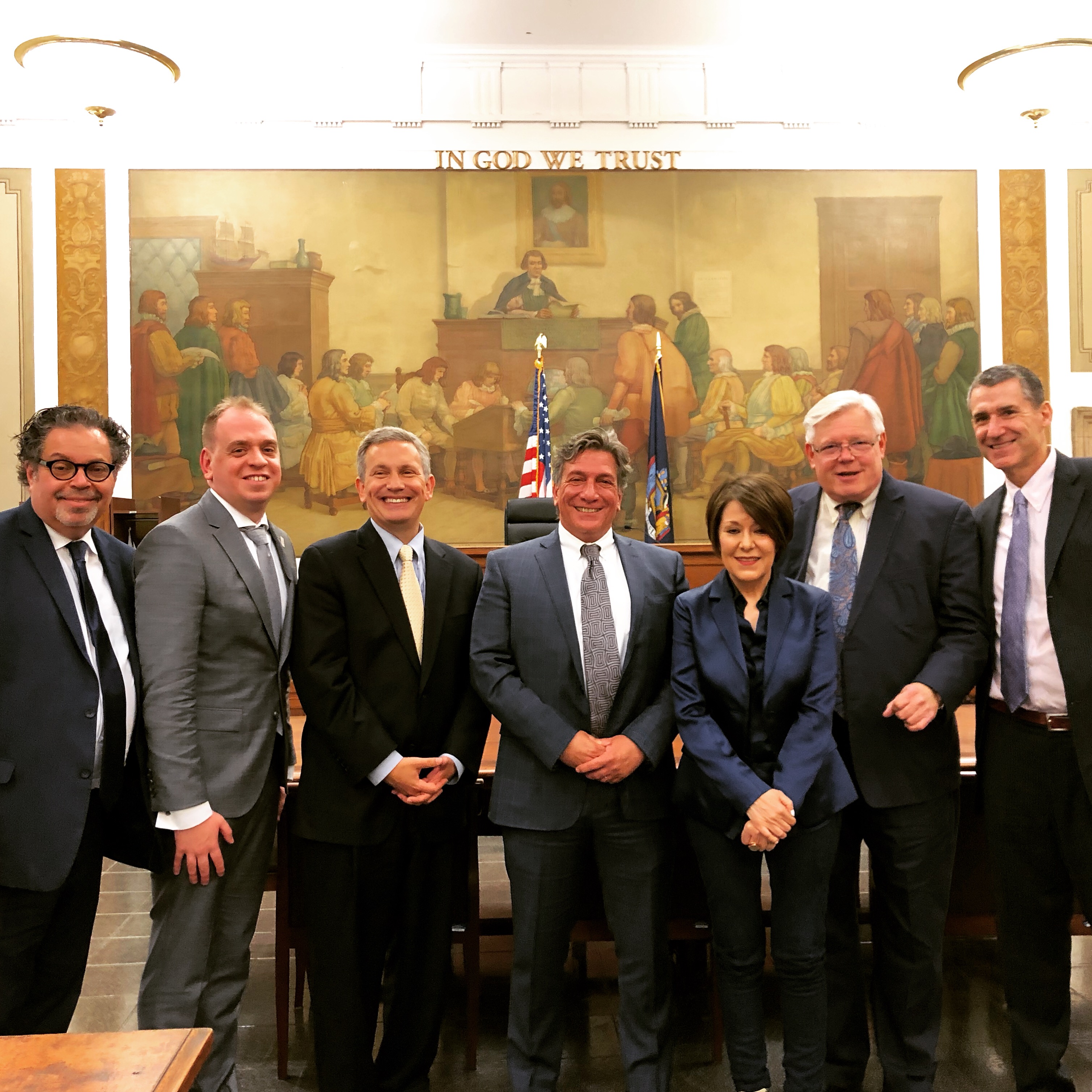On June 3, 2019, The Richard C. Failla LGBTQ Commission of the New York Courts commemorated the 30th anniversary of the New York Court of Appeals’ decision in Braschi v. Stahl Associates Company with a program entitled The Braschi Breakthrough: 30 Years Later, Looking Back on the Relationship Recognition Landmark. The Historical Society of the New York Courts was among the event’s co-sponsors. The video of the program is available to watch below.
In Braschi, interpreting a New York City rent control regulation that protected a surviving member of a deceased tenant’s family from eviction, the Court of Appeals became the first American appellate court to conclude that same-sex relationships are entitled to legal recognition. The case was litigated at the height of the AIDS crisis and sadly, the plaintiff himself died only a year after his groundbreaking court victory.
Inside the Ceremonial Courtroom at the 60 Centre Street courthouse in Manhattan (where the Braschi case started), introductory remarks were made by Matthew J. Skinner, Executive Director of the Failla Commission; Hon. George Silver, Deputy Chief Administrative Judge for New York City; and Hon. Anthony Cannataro, the incoming Co-Chair of the Failla Commission. The speakers included William Rubenstein, Bruce Bromley Professor of Law at Harvard Law School and the man who argued the case before the Court of Appeals as a young ACLU staff attorney, Henry M. Greenberg, President of the New York State Bar Association, Vice-Chair at the Historical Society of the New York Courts, and a law clerk to Hon. Judith S. Kaye in 1989; Hon. Matthew Titone, Surrogate Judge of Richmond County and the son of Hon. Vito J. Titone (the author of the Braschi plurality opinion); former State Senator Thomas K. Duane; and Giannina Braschi, acclaimed writer and the sister of the late plaintiff Miguel Braschi.
Excerpts from Chapter 1 of the book From the Closet to the Courtroom: Five LGBT Rights Lawsuits That Have Changed Our Nation by Carlos A. Ball (2010)
Braschi knew that Blanchard had moved into the rent-controlled apartment many years earlier and that under applicable regulations, the landlord had been prohibited from evicting Blanchard as long as he paid his rent. Braschi assumed that it would be relatively straightforward to have the lease put under his name — he had, after all been living in the apartment with Blanchard for more than ten years, sharing in all matters related to it, including the paying of the rent. Stanley Stahl, the owner of the building, however, had other ideas…
Despite the relatively narrow and safe context in which the case arose, the court’s reasoning in Braschi was nonetheless revolutionary. The groundbreaking nature of the ruling becomes especially clear when it is juxtaposed with the almost complete absence of legal recognition of same-sex relationships anywhere in the country at the time the opinion was issued…
It seems clear in hindsight that Braschi served as a catalyst for the series of incremental steps taken by both the state and city governments that expanded the forms of recognition of same-sex relationships. LGBT rights activists relied on the Court of Appeals opinion to pressure state and city officials to grant same-sex couples the type of legal recognition and protection granted by the state’s highest court. Although the opinion, strictly speaking, was limited to the issue of rent control, its reasoning, which focused on emotional and economic interdependency rather than on the existence of legal formalities, made it more difficult for government officials to reject out of hand the notion that same-sex couples could constitute families and that they were entitled to at least some of the protections afforded by law. To put it simply, same-sex couples in New York after Braschi were no longer legally invisible…
There have been so many relationship-recognition lawsuits since then, most of them involving the question of marriage, that it is perhaps easy to forget that it was all preceded by a housing case from New York in which an American appellate court, for the first time in the nation’s history, concluded that same-sex relationships are entitled to legal protection and recognition…
The event was co-sponsored by:
New York State Unified Court System
NYSBA Committee on LGBT People and the Law
Historical Society of the New York Courts
The LGBT Bar Association of Greater New York (LeGaL)
New York Association of Lesbian and Gay Judges
International Association of LGBTQ+ Judges
Network of Bar Leaders
Gender Fairness Committee of the Supreme Court, Civil Branch, New York County
Gay/Straight Alliance of the New York State Courts
For more information about The Richard C. Failla LGBTQ Commission of the New York State Courts, please visit http://ww2.nycourts.gov/ip/lgbtq/aboutthecommission.shtml

